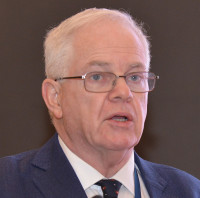The final day focused on 'Looking forward: What's over the horizon?'. Emerging from a period of acute challenge and uncertainty, this is a critical and timely opportunity for our learning and teaching community to reflect, take stock, and look to the horizon. We might ask not only what lies ahead for us as an institution, but who do we want to be, and what do we want to represent – to ourselves and to the outside world – at a local level, across the HE sector, and on an ever-evolving global stage.
Programme
- 13.00 - Welcome speech
- 13.15 - Keynote session
- 14.30 - Parallel session 1
- 15.00 - Closing speech
- 15.15 - Project showcase
Welcome speech by Professor Emma McCoy, Vice-Provost (Education and Student Experience)
Recording

Becoming and belonging in higher education: What does the future hold and how can we make it our future?
Professor Simon Marginson, Professor of Higher Education, University of Oxford
Recording
FLT - Keynote Simon Marginson [pdf]
In the last two years, universities and their inhabitants, like any others, have encountered bumps along the road. The pandemic turned us upside down and posed long term questions about the respective roles of face to face education and online delivery. Controversy rages about the purpose of higher education, whether it is ‘value for money for consumers’ and whether the growing output of graduates is employable. Geo-politics has shown that it overshadows everything else, with US versus China disrupting science partnerships and breaking down international trust, and the dreadful war in Ukraine pulverising higher education in that country as well as isolating academics and students in Russia. What is coming across the horizon and how will we deal with it? How can higher education and belonging in higher education become stronger? Simon Marginson argues that it is vital not to be distracted by tangents such as employability, which are about institutional accountability not students, and to focus firmly on three activities at the core of higher education, the foundations of everything else: (1) teaching and learning, fostering students as self-forming reflexive agents engaged in knowledge; (2) research, the creation, communication and reproduction of knowledge; and (3) strengthening relations with all other social sectors. During the pandemic it has become very obvious that student self-formation is maximised in real-place education and sociable settings, and that local and international diversity, ‘learning through the world’ and ‘learning through the other’, are crucial to higher education and research. No one can predict with certainty what is coming, reality is not fixed it is emerging and the future is never the same, but in taking these lessons forward, strengthening our core missions while strengthening each other, we will pilot higher education through geo-politics and other future shocks.
1a: Can reflection sow the seeds for sustainable culture change?
Dr Iro Ntonia, Centre for Higher Education Research and Scholarship
Through the iExplore STEMM Module ‘Science of Learning’, we have implemented a low-stakes curriculum design approach to help UG students develop a habit of reflecting on their engagement with their learning. In this talk, I will introduce the learning design rationale behind our approach, and consider what the key long-term benefits of embedding reflection might be.
1b: The developing Student Partnership at Imperial – through the pandemic and into the future
Dr Mike Streule (Centre for Higher Education Research and Scholarship) and Chemical Engineering colleagues and students
FLT 2022 - The developing Student Partnership at Imperial – through the pandemic and into the future [pdf]
Staff-student partnership is about developing new and authentic partnership relationships between staff and students. Over the past years, and particularly during periods of remote learning, understanding, developing and enhancing the relationship with students has never been more important. In this talk, we will share perspectives on the current progress of the student partnership at Imperial; where we are now and where we are going in a post-pandemic education as well as the challenges that may lie ahead. We will also showcase this relational approach in the Department of Chemical Engineering with staff and students recounting their stories and experiences as practitioners of this approach through the StudentShapers programme and more broadly across the student experience.
Closing speech by Professor Martyn Kingsbury, Director, Centre for Higher Education Research and Scholarship
Recording
Our exhibition and project showcase incorporated information on Learning and Teaching Strategy funding and educational research from across the College. All posters are still available to view via the virtual poster gallery.